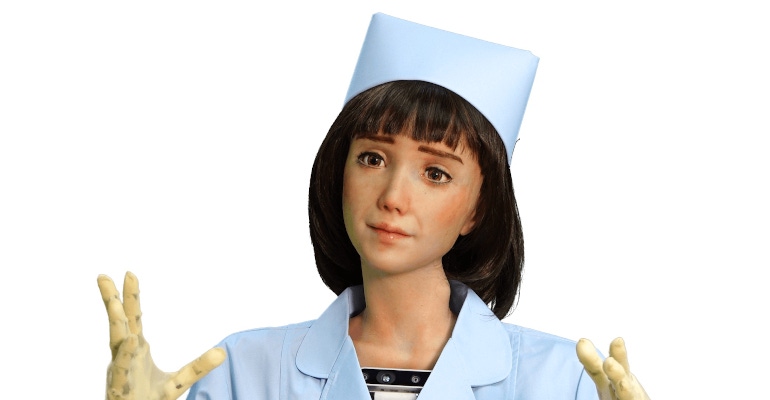Bringing a Little Grace to Robotics
A humanoid robot named Grace can respond to human emotion and transfer knowledge between tasks and situations.
June 1, 2022

We keep hearing the robots are coming, and this time they may bring a little grace along with their artificial intelligence and advanced movements. Awakening Health, a joint venture between Hanson Robotics and SingularityNET, is developing Grace, a humanoid robot designed specifically to support healthcare, well-being, and long-term companionship in a healthcare facility setting, Janet Adams, chief operating officer of SingularityNET, tells Design News. Already under development for more than a year and a half, Grace is an advanced system capable of free-form artificial intelligence in demo situations and significantly advanced towards an early-stage Minimum Viable Product (MVP), she said.
“The goal of the Grace project is to develop a neural-symbolic dialogue system together with vision and navigation subsystems to control a healthcare assistant robot, Grace, both to perform predictable actions in certain user interaction scenarios and to engage in open dialogues,” Adams explained. “A novel approach and system have been developed to provide capabilities in the context of elderly healthcare including doctor appointment, medication management, recovery exercises, and meditation guidance, which require coordination between vision, dialogue, and motion control components. These tasks also require supporting non-linear dialogues with changing and resuming unfinished topics and tasks, repetitions, etc.”
Grace will utilize artificial general intelligence (AGI). “With narrow artificial intelligence, an algorithm or AI model can only perform one simple task at a time. They struggle with unexpected events or inputs, they have little ability to transfer knowledge from one task to another, and [they] require large well-balanced data sets in order to perform at a useful level,” Adams said. “AGI will overcome these limitations by bringing intelligence that can transfer knowledge between tasks and situations, cope with a greater range of environments and situations, and operate with smaller, more skewed, and dirtier data sets.” She added that Grace will be “progressively upgraded to become smarter, more adaptable and more useful in a wider range of scenarios.”
To support multiple AI and AGI algorithms in a unified structure, Grace utilizes OpenCog language. “Cognitive processes embodying these different paradigms interoperate together on a common neural-symbolic knowledge store called the Atomspace. The interaction of these processes is designed to encourage the self-organizing emergence of high-level network structures in the Atomspace, including superposed hierarchical and heterarchical knowledge networks, and a self-model network enabling meta-knowledge and meta-learning,” said Adams. “The opencog atomspace is used in the Grace system for Abstract Meaning Representation (AMR). AMR’s original graphs were extended to ‘AMR Templates’ with application to intent recognition with structured parameters and response generation in dialogue systems.”
SingularityNET will also be utilizing blockchain, particularly the Cardano platform for enhanced security and data privacy via homomorphic encryption. This will enable a decentralized infrastructure for humanoid robots, which Adams said is important for three core purposes:
“So that the benefits of these powerful technologies are democratically distributed and benefit humanity at large, not just the elite few with access to funding and the resources to develop advanced technologies for their own benefit.
So that the diversity of human life across the planet is fully reflected in the development of these tools, for the richest expression of consciousness and cultures possible in the advanced artificial intelligence life forms of the future.
The more developers and contributors across the planet who contribute to the development of advanced artificial intelligence, the greater and the faster these technologies will advance and flourish and offer all-new solutions to the problems manifesting in our societies in present day, and relieve suffering.”
Grace is designed to be empathetic in that she can recognize and respond to seven human emotions, speaks fluent English and Korean, and can mirror her interlocutor’s facial expressions, SingularityNET shared in a news release. She can also be customized in terms of apparel and hairstyle. “The robot has been developed with a particular style and look, optimised for empathy, companionship, and love. We plan to create a variety of healthcare assistants with different genders, ethnicities, skin colors, and personalities, but any further individual customization would need to be discussed with her manufacturer Hanson Robotics.”
No regulatory filings have been submitted to date, but SingularityNET is working with medical resource establishments such as the McGill University in Montreal to progress towards such filings, Adams said.
About the Author(s)
You May Also Like





